it is your birthright to be devastated.
you must have enough courage to love life one more time, and always to love life one more time.
“In the depths of winter, I finally learned that within me there lay an invincible summer".
- Albert Camus, from 'Return to Tipasa' (1952)
dear little voice,
perhaps you have thought, until now, that the natural bud of the Tree is green— and the gorgeous kind: Edenic green, like with apples and like rosy, like with birdsong, with happiness: like with crisp, unguarded happiness, and the Sun like a fleshy ray that laughs and lures her from her branch in Spring.
perhaps you have thought, little voice, that the winter Tree is a dead, waiting thing: a scarce sketch of patience. an empty thing ungladdened and waiting for Sun. perhaps you have considered the Winter Tree to not be a Tree at all. perhaps you have instead named her Branches.
but a Winter Tree is not simply a waiting creature. and Winter is not a Dead Thing.
it is simply easy for little voices to think this because, sometimes, it can feel empty and cold and sometimes your socks can get wet. and little voices don’t often enjoy their socks being wet. it is well known they prefer them dry, and warm, and perhaps tucked with thistle and maybells and smelling of woodfire smoke and someone we love.
a Winter Tree is not bare. she is not empty. she is not Branches. she may not know this, but the Tree has everything within her already: her leaves, tumbled now, are mulching the damp forest Earth, and her roots are drawing Winter’s wetness to her Heart, grounding her against the season’s storms. it is true that her winter fruit cannot stain chins as mango does, or feel the fierce knuckle of passion like a fig in a child’s hands, or rim a smile like orange rind, but her cones, nuts, and baubles- brisk and blue-hemmed with night- are the ones that feed the Winter-hungry mice and squirrels before they can cry. her loose bark does not aspire to the summer softness of a petal, but it does feed the starving deer, and creates prolific homes for the shivering caterpillars and confused larvae. she has no leaves that giggle as spring does- like child-daisies and stars and peaches. she does not toss her hair like the flirtatious, sunned chrysanthemums, or sing the cherries’ summertime opera, but her bare branches do sigh like Bells when stirred by the wind in the night: a song sung for only the loneliest still-dreaming Hearts with eyes open in the dark.
she is not a dead thing. she is the Heart of the wood. she is holding life in her mouth.
she is simply just getting on with it quietly.
unknown photographer.
the Tree cannot know this, because Trees think in silence- and, of course, when they do think in sound the sounds are not a human, word-kind of sound, but a song like two eyelashes brushing together, or a note of rain on a bare peach-leave.
(this, i think, little voice, is a very clever way to think).
she does not beg for Spring. she does not desperately, tenderly reassure herself that Spring will come again soon, babbling down the hill, spilling buds to her branches.
she simply sings a Silent Winter Song. she simply Trusts in her roots to create Life in the cold. they have, after all, been making their way through the Earth for a very long time in all kinds of complicated ways that even she may not understand.
even when she cannot release the flowers of her own buds, her grand cosmic warble goes on: she still draws toward herself all the Sun she can step into, her leaves still murmur in yellowsong, the Earth remains damp with Life— and she, little voice, remains the centre of all this Living.
Geraldine Pilgrim - Dreams of a Winter Night // Photographed by Susan McKeon.
it is tempting, of course, to imagine the Winter Tree to be cold and dead with her cracked branches. it is tempting to think the same of ourselves in our own Winters: whether they arrive slowly- like cold light bleeding through a slat in a door- or in a sudden shove of mourning, departing us cracked and alone.
George Batailles once said that a being that isn’t cracked isn’t possible.
a being that isn’t cracked isn’t possible.
from the moment our little voices are very, very little indeed, we are taught to ignore our Winter cracks: to stuff them down into our pockets until their quiet song is muffled and moth-ball mottled and mute. we are taught to pretend that they are not there at all.
but it is quite hard to ignore wet socks.
and if we are clever enough, little voice, we eventually move from simply ignoring and enduring the cracks in silence (from sadness) and toward sharing them (to Poetry). like Winter Trees, we steady our roots, we acknowledge the threshold, and, perhaps, we even sprout a white-topped mushroom for an aching deer.
i will tell you something, little voice: in these wintered cracks is your home.
they are a space so free, and so wide, and so alive, with altitudes and latitudes so dazzlingly spare and clean that in them you can come to meet yourself— perhaps for the very first time. these cracks split the cells between yourself and your little voice.
go up into the cracks, little voice. find them; they shift and vanish, and will try to slip from your fingers, but you can follow after the cracks. you can squeak into the cracks like a little key in your solid trunk, turn, and unlock the cracks to reveal more: a universe.
this is how you can spend an afternoon. spend a morning. spend a life. and when a little voice chases and pushes open the cracks for long enough— well, that’s just how the light gets it.
any little voice willing enough to look closely at the cracked arch of a winter Tree branch — and why walk about, really, at all, if not to relish in the absolute ecstacy of attention?— is rewarded with the immediate, breathless recognition that the branches that appeared at first empty are indeed not empty at all: they already covered in tiny, precious, sleeping promises of Spring. they are simply covered in buds.
and we know, of course, that even though these little buds are born in Summer, they are only here because of the Heart of Winter: a Winter that protects them with a fierce and taxing tenderness with her thick scales from the cold air, the hoof-like eagle-talons, and the sharp bites of gnats.
as Winter-scholar Katherine May writes:
“There is a lovely term in botany — vernalization — referring to seeds that can only thrive in spring if they have been through the severity of winter. Well, many aspects of our life have become, in the past several hundred years, “vernalized.” …If we didn’t remember winter in spring, it wouldn’t be as lovely; if we didn’t think of spring in winter, or search winter to find some new emotion of its own to make up for the absent ones, half of the keyboard of life would be missing. We would be playing life with no flats or sharps, on a piano with no black keys.”
- Katherine May.
buds, when tended to patiently through the cracks, by Nica Mille
this is what a Winter is: a threshold. a protecting thing. a crack at which to tug at— and, eventually, to move through: through and into a world purely of that soft, filtered light.
and what if Winter Trees’ cracks were not cracks, but doors to Spring?
and yours, little voice? what are they?
the choice is much yours.
“I know that there are thorns in the hedges, but that does not prevent me from putting out my hands and finding flowers there. If all are not beautiful, all are interesting. Such is life! And if one does not take life like that, then how can one endure it?”
the true blossomer and poet Wallace Stevens, in his poem The Snow Man, calls searching for the cracks a mind of winter:
winter is the threshold without illusion.
a mind of winter moves to the centre of this word:
threshold. from the Old English threshen— or, little voice: to separate the grain from the husk. a delicate, wild, often violent, precarious process that makes great demands of a little voice’s aliveness.
Trees’ leaves fall in autumn blindness. we shed. the husk is peeled from the grain. we are suddenly, profoundly bare— and, finally: there is less between ourselves and the World.
beauty is not always a simple thing of loveliness. it is not always a Spring .
it can arrive, instead, with a wildness, an otherness, and a dangerousness: with Winters, with a possibility that demands a profound patience: you must cross this threshold also.
Winters of the spirit come in very different forms in human beings: each meaningful, and all cumulative and strange and wonderful in how they take their cool touch to our souls and begin their Good Work.
there are unkind ways to be in our Winters, and kind ways to be in our Winters. a mind of winter lets a little voice choose between the two.
it is true that our survival depends on this: how we approach our Winter cracks.
if this seems difficult and strange, little voice, that is okay also. we will start with the first step, together: you only need to take off your socks and shoes.
there: isn’t that better? to be bare? to have, again, less between yourself and the World?
yes: it is a much more gentle way of walking, that barefoot way: authentic, vulnerable, sensitive to your surroundings— perhaps warm sand and perhaps sharp rocks and sometimes in the dark but always, always toward the light that shifts through the cracks.
Rainer Maria Rilke, tr. by Edward Snow, Uncollected Poems
when we cross a threshold, and we enter Winter for a time, if we do it bare, we do it right. this is simple.
this, little voice, is a radical, tender act: holding not only an acceptance of Winter, but an active, trained curiosity toward it.
it is a refusal to sense the season as a mere loss of warmth and light— and, instead, to acknowledge it for what it is: a threshold. a purification. a protector equal in Beauty, in Peace, in Mystery, in Strangeness, and Sublimity to Spring.
so much of the pain of our human loneliness is pain of concealment and fear: hastily tidying up our vulnerabilities, tucking ugliness away, and slapping hands over our scars as though these artefacts of our humanity- of longing, of desire, of our deep, unassailable commitment to our aliveness, of each Life you have brushed against and each moment you have noticed you have one of your own- are at all shameful.
Mario Giacomelli I “Priests Twirling in the Snow,” 1960s I The Carol Carisle Auction
Poetry is a barefoot thing. you can live it every hour. you can live it every day.
it is not a mere prettiness. it is reconciliation: a reconciliation to our world. in the complication of a moment, its task is to allow us a measure of divine tenderness with which to exist and acknowledge the scope of our very fragile, very mortal, very brave lives.
after all, Life is not a particularly safe investment. we know this. it seems that to commit to it at all is to be wrung out and broken in the heart. no, it’s not enough to live: little voice, we have to really be in it, too: to move, to love, to cry out entered, touched, possessed; awakened and then suddenly changed beyond all imagining.
this is your debt to it, little voice: you will have Winters. you will watch your own heart’s dismantling in awe. you will be devastated. there will be times where you can only utter: how could such? and what if?
it is your birthright to be devastated.
this, too, is simply a measure of a little voice’s own barefootedness. of a little voice’s own aliveness.
if you have read this little letter and still decided that you would much prefer to keep your heart in tact and unbroken, then my logical advice is that you from now on give your heart to no one and nothing, not even a lover, not even a flower or a poem or a seashell or the past, and especially not the future. i suppose you should then have to wrap it up very carefully. you could even nail it away in a little box or coffin and close your little eyes to all the cracks. in that little box it will be safe and motionless and airless. but it will also be dark and cold; your heart will be changed: it will become unbreakable but it will also become untouchable.
there are other worlds, little voice: worlds in which Winter is not merely feasible, but honourable. perhaps even something worth searching for. worlds in which summer’s joy is not the only measure of a Good Aliveness. worlds where winter is a precious, growing thing.
in Winter, you must have enough courage to love life one more time, and always to love life one more time. you must.
Gamou Unosuke, Children in the snow, Japan - 1950
you see: despite everything, little voice, Dostoevsky was right: Beauty Will Save The World.
i am here because I want to infect you with a tremendous willingness toward life. i do this because i believe you have the strength in you to bear it.
and so I urge you to please notice when you are happy, and when you are sad, and when you are not sure what you are, and whatever it is, no matter the season, to exclaim or murmur or think at some point, ‘this here will save the world. this will save the world. this will save the world.’
because, little voice, say this and you spot the bud. and if you don’t see the bud, at least you can it is there. and there is a whole life in that, and a whole world too: that knowing that the bud is there.
it is so very nice to speak with you again. thank you for being patient with my Winter. i take her from my pocket now and hold her song to your ear like a shell picked up in the Night: all sand-struck and cool with Moon. i am not ashamed of her. i know she is a creature to be shared.
in my Winter, i dreamt of a magic world that changes my tears to stars, so that at night, little voice, you can look upwards and know that for you they are innumerable. so that when they ring as stars do- like bells- their gentle sound will find its way to you and sound as stars do: as words. now, wherever i am, and in whichever season, i can know that somewhere, in the night, i am for something.
barefoot, and with love (always, and in every season),
ars poetica






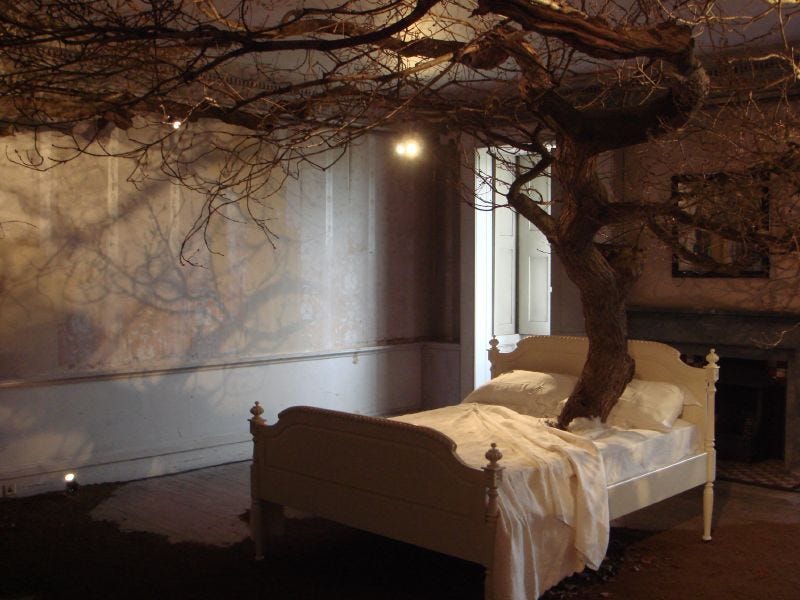

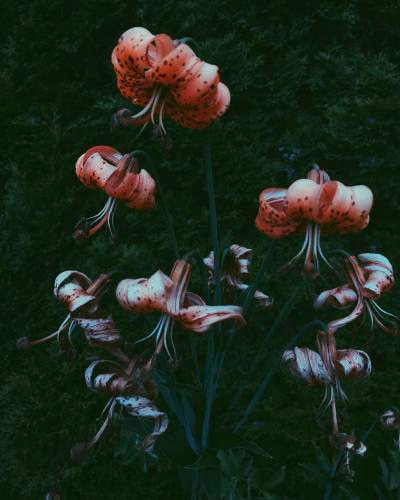
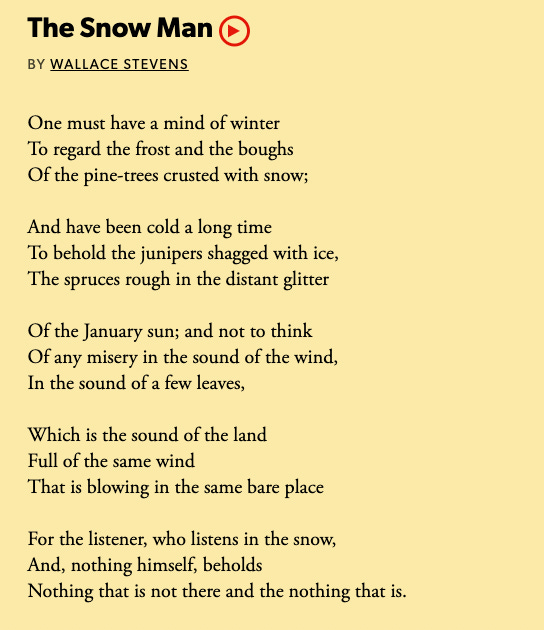
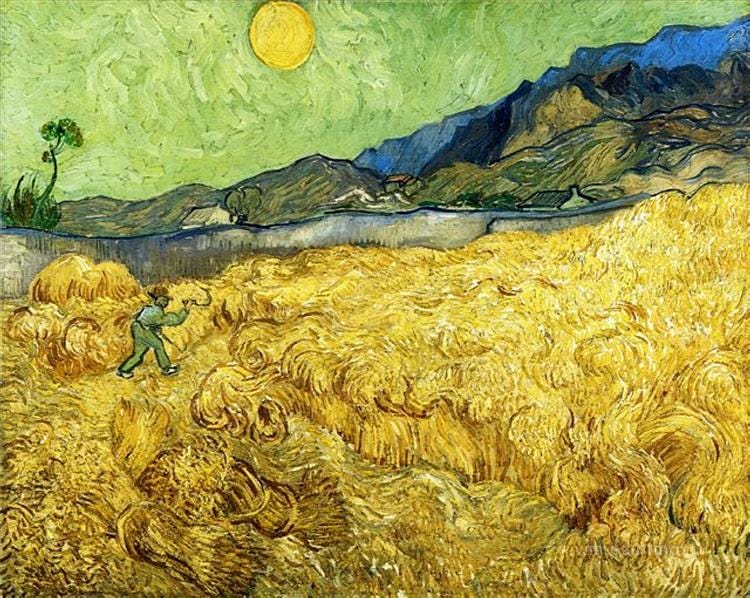



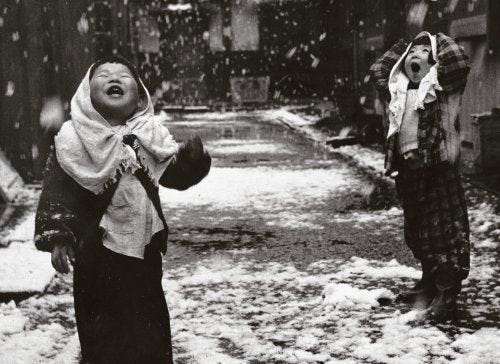

So wonderful 💓
Also - Katherine May writes on Substack! https://katherinemay.substack.com/
I will definitely forward this onto my other poetry friends & allies. Winter is the threshold of Spring's revival. It seems like in the colder months things die and crack. Hearts can be vulnerable too like the trees, the roots, the yet to bloom flowers. So much of this wisdom is extended towards the circulatory affect of the seasons. One cannot be Winter's dark seeds, without Spring's transformation. Thank you so much for this sincere, sacred momento little voice. It has inspired me to dream even deeper as a sky's mirror to the Universe.